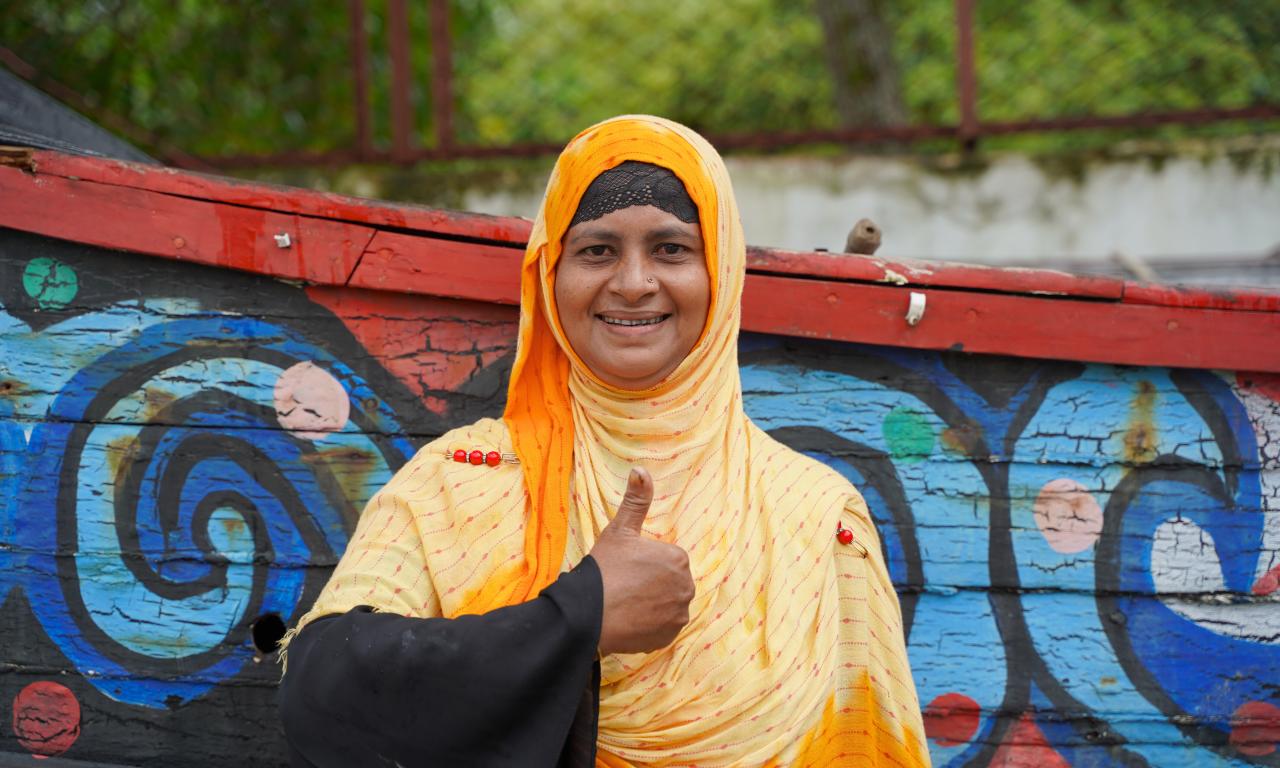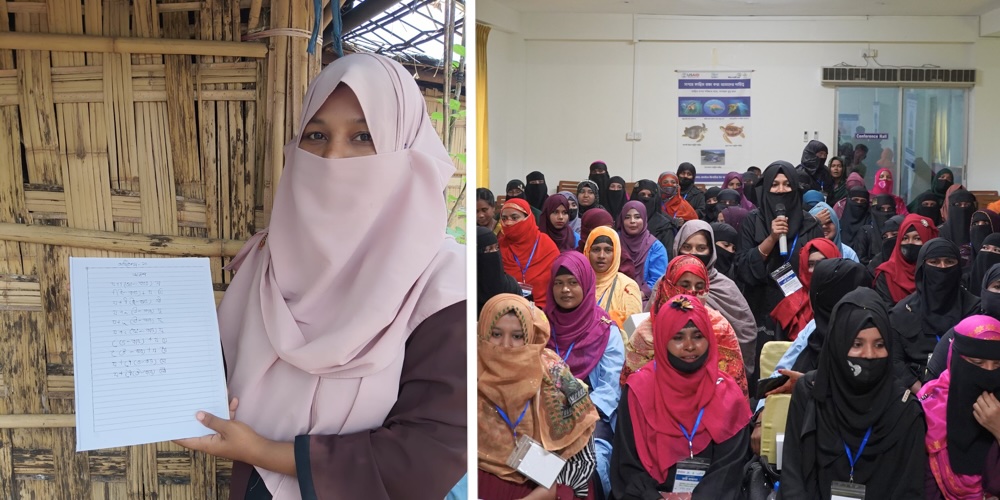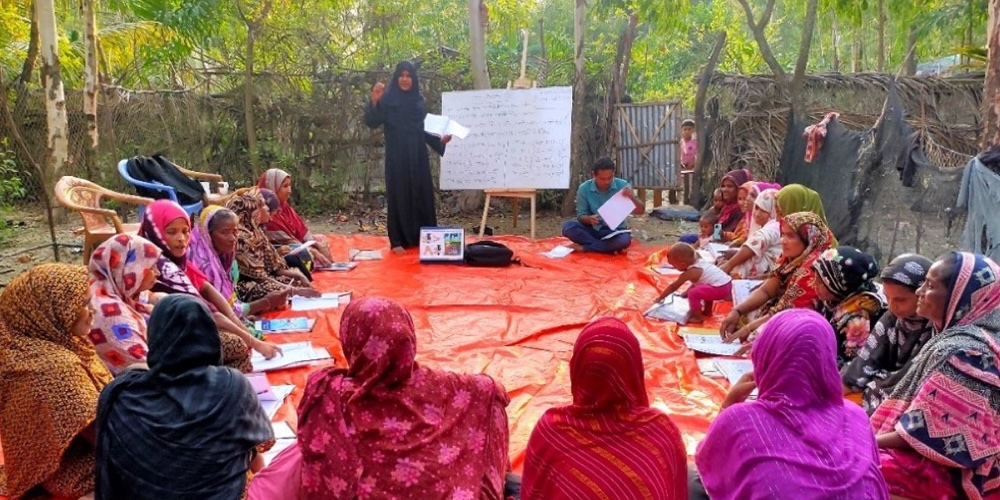
Joba has always dreamed of continuing her education and improving her life. The 26 year-old from a fishing community in Ukhiya, Cox’s Bazar, Bangladesh, has already faced significant challenges in her life. After her father’s death in 2018, financial struggles forced her to leave school at 20. In 2019, she married her husband Giyas, a fisherman. In 2024, she became a participant in WorldFish’s USAID-funded ECOFISH II program. Through the program’s Business Literacy Learning Session, Joba got a second chance at education and she has thrived. Her husband Giyas, who could previously only sign his name, became curious about her studies and asked her to teach him. Today, he can read and write, a skill he learned from Joba, which has brought new respect to their marriage.
Stories like Joba and Giyas’s are still rare. Women from marginalized fishing communities are among the most disadvantaged, with limited access to education and income opportunities and are often constrained by conservative social norms. Many continue to rely on their husbands for financial support and security.

Empowering Women and Transforming Communities
USAID’s ECOFISH II seeks to change this narrative. The program supports 15,000 marginalized artisanal fishing households across Cox's Bazar Sadar, Ukhiya, Teknaf, Kutubdia, Moheshkhali, Kalapara, and Char Fasson Upazilas. It aims to raise awareness about biodiversity conservation, ecosystem health, and alternative livelihoods, offering 24 business literacy sessions to help fishing households manage their small businesses and finances more effectively. These sessions also address nutrition, gender equality, and conservation.
By empowering women in these communities, ECOFISH II is transforming socio-economic realities. The initiative equips women with the tools, resources, and skills to become financially independent, breaking the cycle of reliance on male family members. Through skill-building, livelihood opportunities and promoting financial independence, women are gaining control over their economic futures, boosting household resilience and well-being. This empowerment also fosters environmental stewardship, benefiting both families and the marine ecosystems they depend on.
The project offers critical support, such as training in homestead goat and poultry rearing, safe dry fish production, aquaculture, tailoring, horticulture, and business expansion. These efforts contribute not only to financial stability but also to raising awareness of gender equality. Nutrition-sensitive homestead horticulture is promoted with the provision of vegetable seeds, organic fertilizer, and informational materials, enabling households to improve nutrition and sell surplus produce.
Artisanal fishing communities in Bangladesh continue to struggle with extreme poverty, which was be exacerbated by the 65-day marine fishing ban and the 22-day hilsa fishing ban period, along with decreased fishing days due to adverse climatic events. To help families cope, ECOFISH II has formed 169 Women Income Generating Groups (WING), engaging 5,000 women and fostering a culture of savings. This initiative aims to reshape women’s roles within their families and communities. Traditionally dependent on male breadwinners, women are now contributing to household income, gaining financial independence, and decision-making power.

A Journey to Empowerment
Take the story of Rashida, a 36-year-old woman from Ukhiya, Cox’s Bazar. Once fully dependent on her husband's income, her family fell into deeper poverty after her husband, Firoz Ahmed, had to sell his boat following an accident. He began working as a fishing laborer, further straining their financial situation.
In 2023, Rashida became a beneficiary of USAID's ECOFISH II. With training in homestead goat rearing and a grant of 5,500 Bangladeshi Taka (BDT), she bought a pregnant goat. In just three months, the goat gave birth to two kids, which Rashida sold for 7,000 BDT. With the profit, she purchased seven chickens and two ducks. She also planted vegetables after receiving horticulture training, feeding her family and selling the surplus. Rashida’s hard work paid off quickly. She sold her poultry for 10,000 BDT and bought a sewing machine. Now, with three goats (two of which are pregnant), over 15 chickens, 10 ducks, a sewing machine, and a thriving vegetable garden, Rashida has saved 40,000 BDT. In May 2024, she opened a small grocery shop run by her husband, providing him a safer and more secure livelihood, all while supporting marine biodiversity by avoiding illegal fishing.
Rashida’s journey illustrates the resilience that can emerge from even the smallest opportunities.
As more women like Rashida gain economic independence, men’s attitudes and behaviors are beginning to shift. Husbands and male relatives are becoming more supportive, appreciating the financial benefits of their wives’ successes. This change encourages men to adopt less traditional roles, creating a more equitable and respectful environment.
By investing in women’s empowerment, USAID’s ECOFISH II is not only driving socio-economic change but also fostering a future where communities work together to protect the environment they depend on.
